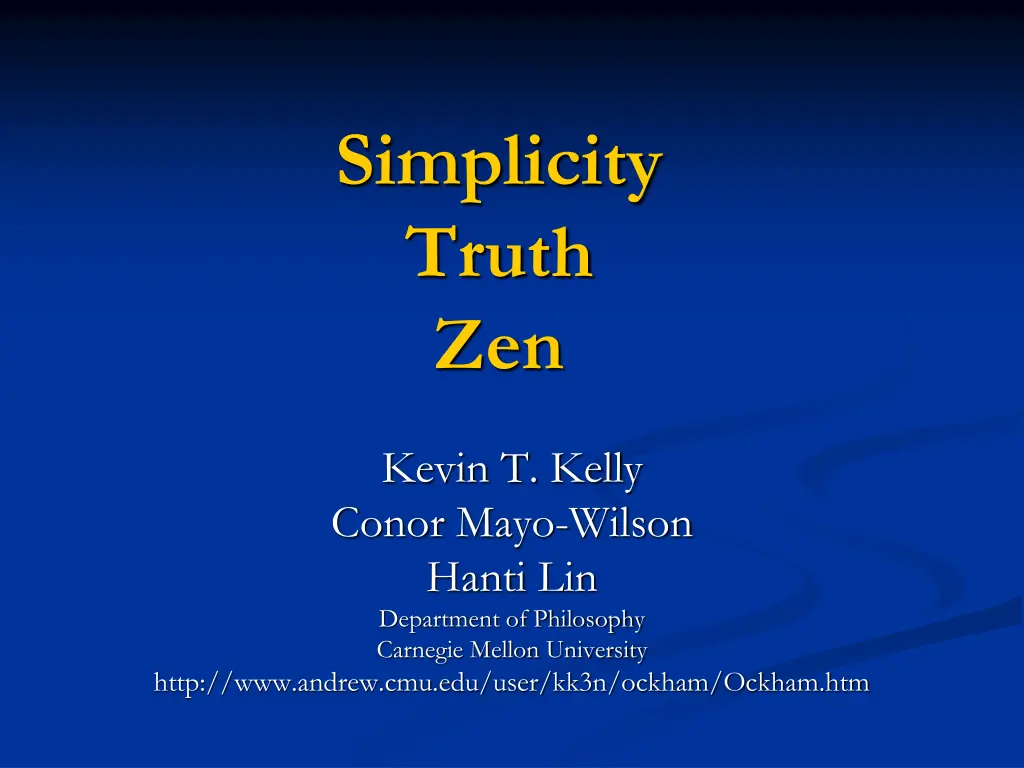
Philosophy and Epistemology - Understanding Truth and Justification
Explore the concepts of simplicity, truth, Zen, underdetermination, Western epistemology, and Zen epistemology through philosophical reflections from Carnegie Mellon University. Delve into Ockham's Razor and historical astronomical observations. Discover the interplay between science, demons, and rationality in different epistemological frameworks.
Download Presentation

Please find below an Image/Link to download the presentation.
The content on the website is provided AS IS for your information and personal use only. It may not be sold, licensed, or shared on other websites without obtaining consent from the author. If you encounter any issues during the download, it is possible that the publisher has removed the file from their server.
You are allowed to download the files provided on this website for personal or commercial use, subject to the condition that they are used lawfully. All files are the property of their respective owners.
The content on the website is provided AS IS for your information and personal use only. It may not be sold, licensed, or shared on other websites without obtaining consent from the author.
E N D
Presentation Transcript
Simplicity Truth Zen Kevin T. Kelly Conor Mayo-Wilson Hanti Lin Department of Philosophy Carnegie Mellon University http://www.andrew.cmu.edu/user/kk3n/ockham/Ockham.htm
Theoretical Underdetermination I dare you to choose one! ???
Western Epistemology The demon undermines science, so defeat him. I smite thee with scientific rationality! R
Western Epistemology The demon undermines science, so defeat him. Portray him as weak. You can t fool me! R
Zen Epistemology The demon justifies science with his strength. Stronger demons justify weaker inferences!
Zen Epistemology How is this supposed to work, eh?
Zen Epistemology If you could do better, you should. But because of me, you can t. So you are optimal and, hence, justified.
Zen Epistemology Isn t that how computer scientists routinely evaluate algorithms? Yes.
Zen Epistemology But computing is deduction. Isn t induction a completely different animal? No. That s what formal learning theory is about.
Zen Epistemology Cool. But how does it apply to science?
Astronomy 1543 Planetary retrograde motion Mars Earth Sun Only at solar opposition
Ptolemaic Explanation Retrograde path is due to an epicycle. Can happen regardless of the position of the sun epicycle
Copernican Explanation Lapped competitor appears to backtrack against the bleachers. epicycle lapping
Copernicus Victorious Explains the data rather than merely accommodating them. Has fewer adjustable parameters. Is more falsifiable (failure of correlation would rule it out). Is more unified. Is simpler.
More Victories for Simplicity universal gravitation vs. divided cosmos wave theory of light vs. particles and aether oxygen vs. phlogiston natural selection vs. special creation special relativity vs. classical electrodynamics Dirac s equation chaos vs. infinite series of random variables
Puzzle An indicator must be sensitive to what it indicates. simple
Puzzle An indicator must be sensitive to what it indicates. complex
Puzzle But Ockham s razor always points at simplicity. simple
Puzzle But Ockham s razor always points at simplicity. complex
Puzzle How can a broken compass help you find something unless you already know where it is? complex
Metaphysicians for Ockham Somehow, I don t like the sound of that
Information Channel Simplicity bias Simple reality Mystical vision Natural selection??
Pre-established Harmony G Simplicity bias Simple reality
Idealism Simplicity bias Simple reality
Metaphysicians for Ockham So before you can use your razor to eliminate Metaphysical causes, you have to assume metaphysical causes.
Theoretical Virtues Simpler theories: Are more unified; Explain better; Are more falsifiable. 1. 2. 3. But the truth might not be virtuous. Wishful thinking to assume otherwise.
Statistical Explanations 1. Prior Simplicity Bias Bayes, BIC, MDL, MML, etc. 2. Risk Minimization SRM, AIC, cross-validation, etc.
Prior Simplicity Bias I am inclined to believe the simpler theory because I am inclined to believe that the world is simple.
More Subtle Version Simple data are a miracle in the complex theory but not in the simple theory. Has to be! P C
However correlation would not be a miracle given P( ); Why not this? P C
The Real Miracle Ignorance about model: p(C) p(P); + Ignorance about parameter setting: p (P( ) | P) p(P( ) | P). = Knowledge about worlds. p(P( )) << p(C). C P Ignorance is knowledge.
= Paradox of Indifference Ignorance of red vs. not-red + Ignorance over not-red: = Knowledge about red vs. white. Knognorance = All the priveleges of knowledge With none of the responsibilities I m for it!
In Any Event The coherentist foundations of Bayesianism have nothing to do with short-run truth- conduciveness. Not so loud!
Ockham Bayesians Converge T2 T1 T3
Ockham Bayesians Converge T2 T1 T3
Ockham Bayesians Converge T2 T1 T3
Ockham Bayesians Converge T2 T1 T3
Ockham Bayesians Converge Oops! T2 T1 T3
Ockham Bayesians Converge T2 T1 T3
Ockham Bayesians Converge T2 T1 T3
Ockham Bayesians Converge T2 T1 T3
Ockham Bayesians Converge T2 Oops! T1 T3
Ockham Bayesians Converge T2 Oops! T1 T3
But So Would Other Methods T2 Oops! T1 T3
Summary of Bayesian Approach Prior-based explanations of Ockham s razor are circular. Convergence-based explanations of Ockham s razor fail to single out Ockham s razor.
2. Risk Minimization Ockham s razor minimizes expected distance of empirical estimates from the true value. Truth
Unconstrained Estimates are Centered on truth but spread around it. Pop! Pop! Pop! Pop! Unconstrained aim
Constrained Estimates Off-center but less spread. Truth Clamped aim
Constrained Estimates Off-center but less spread Overall improvement in expected distance from truth Pop! Pop! Pop! Pop! Truth Clamped aim
